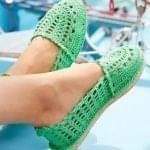Knitting your own shoes can be a unique and rewarding project. Here are a few different types of knitted shoe models you might consider:
- Slippers:
- Basic Knitted Slippers: Simple, cozy slippers that can be customized with different stitch patterns.
- Bootie Slippers: Higher than traditional slippers, often with a ribbed cuff for extra warmth.
- Moccasin-style Slippers: Featuring a textured sole for comfort and durability.
- Socks and Booties:
- Ankle Socks: Knit a pair of lightweight ankle socks, perfect for wearing around the house.
- Cabled Socks: Add some intricate cable patterns to your socks for extra flair.
- Baby Booties: Delicate, small shoes for infants, often with cute embellishments.
- House Shoes:
- Mary Jane House Shoes: Knit slippers with a Mary Jane-style strap for a touch of vintage charm.
- Ballet Flats: Flat, comfortable shoes for wearing indoors.
- Outdoor Shoes:
- Knitted Espadrilles: Combine a knitted upper with an espadrille sole for casual outdoor footwear.
- Sneaker-style Shoes: Create a knitted version of your favorite sneakers.
- Boot Styles:
- Ankle Boots: Short boots that cover the ankle, often with interesting stitch patterns.
- Calf-high Boots: Longer boots that extend up the calf for extra warmth.
- Lace-up Boots: Boots with a lace-up front for a stylish and adjustable fit.
- Flip-Flop Slippers:
- Knitted Flip-Flops: Combine the comfort of knitted fabric with the casual style of flip-flops.
- Sandals:
- Strappy Sandals: Create knitted sandals with multiple straps for a fashionable look.
- Toe-ring Sandals: Simple sandals with a toe ring for a minimalist design.
- House Boots:
- Felted House Boots: Knit oversized slippers and then felt them for added warmth and durability.
- Clogs:
- Knitted Clogs: Combine a knitted upper with a sturdy sole to create comfortable and stylish clogs.
- Lace-up Shoes:
- Oxford-style Shoes: Knit shoes with a lace-up front for a classic and sophisticated style.
Remember to choose the appropriate yarn and needle size for your chosen shoe pattern, and consider adding non-slip soles or using a non-slip fabric on the bottom for safety, especially if you plan to wear the shoes outdoors. Additionally, adjusting the size and fit of the pattern can help ensure a comfortable and customized fit.
 pyomn
pyomn


























